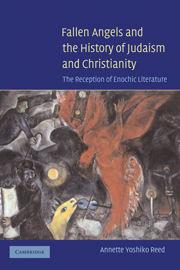Book contents
- Frontmatter
- Contents
- Preface
- List of Abbreviations
- Fallen Angels and the History of Judaism and Christianity
- Introduction
- 1 Angelic Descent and Apocalyptic Epistemology: The Teachings of Enoch and the Fallen Angels in the Book of the Watchers
- 2 From Scribalism to Sectarianism: The Angelic Descent Myth and the Social Settings of Enochic Pseudepigraphy
- 3 Primeval History and the Problem of Evil: Genesis, the Book of the Watchers, and the Fallen Angels in Pre-Rabbinic Judaism
- 4 The Parting of the Ways? Enoch and the Fallen Angels in Rabbinic Judaism and Early Christianity
- 5 Demonology and the Construction of Christian Identity: Approaches to Illicit Angelic Instruction among Proto-Orthodox Christians
- 6 The Interpenetration of Jewish and Christian Traditions: The Exegesis of Genesis and the Marginalization of Enochic Literature
- 7 The Apocalyptic Roots of Merkabah Mysticism? The Reemergence of Enochic Traditions in Rabbinic Judaism
- Epilogue
- Bibliography
- Index of Modern Authors
- Index of Primary Sources
- Subject Index
3 - Primeval History and the Problem of Evil: Genesis, the Book of the Watchers, and the Fallen Angels in Pre-Rabbinic Judaism
Published online by Cambridge University Press: 17 August 2009
- Frontmatter
- Contents
- Preface
- List of Abbreviations
- Fallen Angels and the History of Judaism and Christianity
- Introduction
- 1 Angelic Descent and Apocalyptic Epistemology: The Teachings of Enoch and the Fallen Angels in the Book of the Watchers
- 2 From Scribalism to Sectarianism: The Angelic Descent Myth and the Social Settings of Enochic Pseudepigraphy
- 3 Primeval History and the Problem of Evil: Genesis, the Book of the Watchers, and the Fallen Angels in Pre-Rabbinic Judaism
- 4 The Parting of the Ways? Enoch and the Fallen Angels in Rabbinic Judaism and Early Christianity
- 5 Demonology and the Construction of Christian Identity: Approaches to Illicit Angelic Instruction among Proto-Orthodox Christians
- 6 The Interpenetration of Jewish and Christian Traditions: The Exegesis of Genesis and the Marginalization of Enochic Literature
- 7 The Apocalyptic Roots of Merkabah Mysticism? The Reemergence of Enochic Traditions in Rabbinic Judaism
- Epilogue
- Bibliography
- Index of Modern Authors
- Index of Primary Sources
- Subject Index
Summary
THE PREVIOUS CHAPTER CAUTIONED AGAINST THE ASSUMPTION THAT the authors and audience of the Book of the Watchers should be sought only on the margins of mainstream Judaism. There, we considered the reinterpretation of Enochic myth of angelic descent in three works, each of which exhibits a close connection with the Book of the Watchers; ben Sira reflects the same milieu of Judaean priestly scribalism, while the Book of Dreams and Epistle of Enoch self-consciously operate within the Enochic literary tradition. In these cases, it is not difficult to explain how these authors gained access to our text, nor why they might choose to use and rework it. Towards mapping the early Jewish reception-history of this book, the present chapter will chart the scope of this apocalypse's influence among other pre-Rabbinic Jews and measures the scale of its impact in different groups and locales.
Here too, questions about the status of the Book of the Watchers are important to investigate; for, as we shall see, the classical Rabbinic literature contains no reference to Enochic texts and few traces of Enochic traditions. As with so much of the Jewish literature composed during the Second Temple period, the Book of the Watchers would be preserved primarily in Christian circles. There are a range of possible explanations for this situation. At one extreme is the possibility that early Sages rejected this book despite its popularity in Second Temple Judaism; at the other is the possibility that some Christians adopted a book that most Jews never valued to begin with.
- Type
- Chapter
- Information
- Fallen Angels and the History of Judaism and ChristianityThe Reception of Enochic Literature, pp. 84 - 121Publisher: Cambridge University PressPrint publication year: 2005



